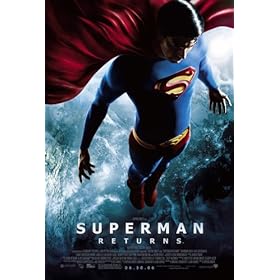I saw it Friday afternoon -- the wife and I have been a little nutty for
Superman since we got on a kick to watch all the old
Reeve movies a few months ago. Then we got into
Smallville. I thought all this buildup would climax with
Superman Returns... But it didn't. We're into season 4 of Smallville now, and despite a seeming return to 'freak of the week' episodes, I'm on the whole much more interested in the Smallville plotlines than I was in
Bryan Singer's take on Superman. A few reasons follow... and, warning, spoilers ahead.
 .
. After the second Superman movie back in 1980 (where this one is supposed to pick up from), Lois knows that Clark is Superman. I can forgive this movie for taking license with the particulars of 'what happened' in a movie from 26 years ago, but I think going back to a state of ignorance about Clark/Superman between Clark and Lois was a mistake. We have a missed opportunity here to explore a really weird, kind of creepy, distinctly post-human relationship between these two. If you'll recall, Clark loved Lois and Lois loved Superman. Superman couldn't love Lois, and Lois didn't love Clark. It's a love triangle between two people. This movie could have dug much deeper into the weird mechanics of a superhuman and secret-identity love affair, and taken us deeper into what it means to love an alien who can't love you back (an alien that's also pretending to be a human who does love you very much)... but it just sort of left things at
blah between them. Although I thought the attempt to show Lois' conflict (being in love with two great guys) was good enough, I sure thought it could have been more complicated, and in a good way. We could've handled it.
. Brandon Routh was an adequate Superman. But I agree with
the reviewer who said he didn't really bring anything new to the role. The wife said he looked perfect, "like a doll" -- and he was certainly likeable enough. But we, as a culture, have had some 74 years now to metabolize Superman, and we're ready for the tougher stuff. At least I am. Show us how odd his life is, how much he struggles to be like us, show us his ambivalence toward his powers -- show that he feels disdain and disappointment towards humanity more often than we (humans) would want to know about. Cough up some ugly (or at least alien) feelings now and again. We've been waiting for that for a long time, and we still haven't gotten it. Maybe it's more a problem with this
concept of Superman, or with the script, than with the actor -- but I think he could have made his Superman less conventional if he'd tried harder, even with such a safe script.
. Which brings me to the deadest lines Routh delivered in the movie -- sitting on his sleeping son's bed, telling him how life was going to be... This moment should have been emotional (painful for him, really) and full of conflicted feelings (like: oh no, I didn't raise the boy -- oh no, Richard did -- oh no, is a child able to handle knowing who I really am? -- oh no, doesn't he deserve to know that he's Kryptonian? -- oh no, I can't raise my own son! etc.). But instead the scene is cardboard. It was a cardboard sandwich with a side of glue and some paperclip salad. That was Routh's big chance to
get us, and he dropped the ball.
. Lex wasn't as complex as he needed to have been. Maybe it's because I've been watching
Rosenbaum on Smallville and he's set such a high bar -- but
Kevin Spacey just didn't play the Luthor I wanted to see. I needed more of the "gods are selfish beings who fly around" attitude to be turned into some kind of "therefore I'm going to rid the world of Superman forever -- for the good of us all" action in order to sympathize with him. I really could have sympathized with a villain who believes he has everyone's best interest at heart. I sympathized with
Cosmo in
Sneakers, you know. I can't sympathize with a
simple evil dude. Spacey (or the writers) could have made Luthor into more of a Lex we know from Smallville -- someone who becomes "evil" because he tries too often to do good and has his face put in the mud for it over and over again. Even the just-plain-scary stuff Spacey tried to do, like when he goes from polite super-villain banter to a crazy shout-down of Lois on the ship, didn't really affect me. I wasn't, like, real scared. I'm a little bit beyond the pg-13 view of 'good vs evil' and I wish the makers of this film had been too.
. All that said, the movie had plenty of good about it. The good stuff is pretty easy to see, so there's no need to lay it out here. Superman returns (and man, I wanted to cheer) when he saves that plane. Perfect. But next time, let's go for something a hair more mature, huh? Superman deserves it and so do we.



